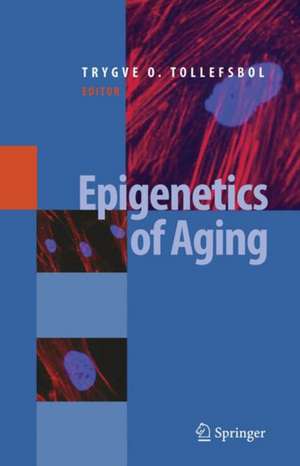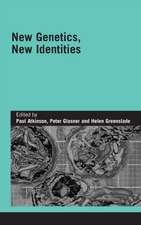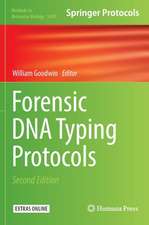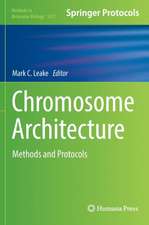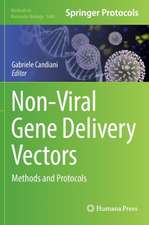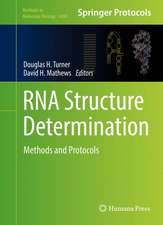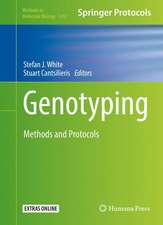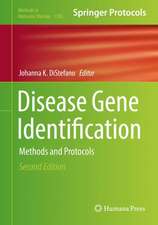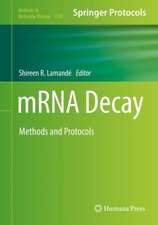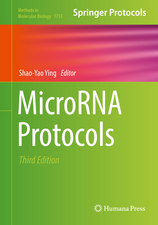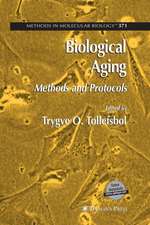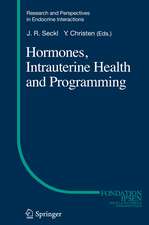Epigenetics of Aging
Editat de Trygve O. Tollefsbolen Limba Engleză Hardback – 17 noi 2009
The most studied of epigenetic processes, DNA methylation, has been associated with cellular aging and aging of organisms for many years. It is now apparent that both global and gene-specific alterations occur not only in DNA methylation during aging, but also in several histone alterations. Many epigenetic alterations can have an impact on aging processes such as stem cell aging, control of telomerase, modifications of telomeres, and epigenetic drift can impact the aging process as evident in the recent studies of aging monozygotic twins.
Numerous age-related diseases are affected by epigenetic mechanisms. For example, recent studies have shown that DNA methylation is altered in Alzheimer’s disease and autoimmunity. Other prevalent diseases that have been associated with age-related epigenetic changes include cancer and diabetes. Paternal age and epigenetic changes appear to have an effect on schizophrenia and epigenetic silencing has been associated with several of the progeroid syndromes of premature aging. Moreover, the impact of dietary or drug intervention into epigenetic processes as they affect normal aging or age-related diseases is becoming increasingly feasible.
| Toate formatele și edițiile | Preț | Express |
|---|---|---|
| Paperback (1) | 1104.68 lei 6-8 săpt. | |
| Springer – 27 noi 2014 | 1104.68 lei 6-8 săpt. | |
| Hardback (1) | 1110.32 lei 6-8 săpt. | |
| Springer – 17 noi 2009 | 1110.32 lei 6-8 săpt. |
Preț: 1110.32 lei
Preț vechi: 1168.76 lei
-5% Nou
Puncte Express: 1665
Preț estimativ în valută:
212.48€ • 230.73$ • 178.49£
212.48€ • 230.73$ • 178.49£
Carte tipărită la comandă
Livrare economică 22 aprilie-06 mai
Preluare comenzi: 021 569.72.76
Specificații
ISBN-13: 9781441906380
ISBN-10: 144190638X
Pagini: 484
Ilustrații: XIX, 469 p.
Dimensiuni: 155 x 235 x 35 mm
Greutate: 0.82 kg
Ediția:2010
Editura: Springer
Colecția Springer
Locul publicării:New York, NY, United States
ISBN-10: 144190638X
Pagini: 484
Ilustrații: XIX, 469 p.
Dimensiuni: 155 x 235 x 35 mm
Greutate: 0.82 kg
Ediția:2010
Editura: Springer
Colecția Springer
Locul publicării:New York, NY, United States
Public țintă
ResearchDescriere
Recent studies have indicated that epigenetic processes may play a major role in both cellular and organismal aging. These epigenetic processes include not only DNA methylation and histone modifications, but also extend to many other epigenetic mediators such as the polycomb group proteins, chromosomal position effects, and noncoding RNA. The topics of this book range from fundamental changes in DNA methylation in aging to the most recent research on intervention into epigenetic modifications to modulate the aging process. The major topics of epigenetics and aging covered in this book are: 1) DNA methylation and histone modifications in aging; 2) Other epigenetic processes and aging; 3) Impact of epigenetics on aging; 4) Epigenetics of age-related diseases; 5) Epigenetic interventions and aging: and 6) Future directions in epigenetic aging research.
The most studied of epigenetic processes, DNA methylation, has been associated with cellular aging and aging of organisms for many years. It is now apparent that both global and gene-specific alterations occur not only in DNA methylation during aging, but also in several histone alterations. Many epigenetic alterations can have an impact on aging processes such as stem cell aging, control of telomerase, modifications of telomeres, and epigenetic drift can impact the aging process as evident in the recent studies of aging monozygotic twins.
Numerous age-related diseases are affected by epigenetic mechanisms. For example, recent studies have shown that DNA methylation is altered in Alzheimer’s disease and autoimmunity. Other prevalent diseases that have been associated with age-related epigenetic changes include cancer and diabetes. Paternal age and epigenetic changes appear to have an effect on schizophrenia and epigenetic silencing has been associated with several of the progeroid syndromes of premature aging. Moreover, the impact of dietary or drug intervention into epigenetic processes as they affect normal aging or age-related diseases is becoming increasingly feasible.
The most studied of epigenetic processes, DNA methylation, has been associated with cellular aging and aging of organisms for many years. It is now apparent that both global and gene-specific alterations occur not only in DNA methylation during aging, but also in several histone alterations. Many epigenetic alterations can have an impact on aging processes such as stem cell aging, control of telomerase, modifications of telomeres, and epigenetic drift can impact the aging process as evident in the recent studies of aging monozygotic twins.
Numerous age-related diseases are affected by epigenetic mechanisms. For example, recent studies have shown that DNA methylation is altered in Alzheimer’s disease and autoimmunity. Other prevalent diseases that have been associated with age-related epigenetic changes include cancer and diabetes. Paternal age and epigenetic changes appear to have an effect on schizophrenia and epigenetic silencing has been associated with several of the progeroid syndromes of premature aging. Moreover, the impact of dietary or drug intervention into epigenetic processes as they affect normal aging or age-related diseases is becoming increasingly feasible.
Cuprins
TABLE OF CONTENTS1. Epigenetics and the Aging ProcessTrygve O. TollefsbolPART I: DNA Methylation and Histone Modifications in Aging2. Age-related Genomic Hypomethylation Igor P. Pogribny and Boris F. Vanyushin3. Gene-specific Hypermethylation in Aging Adebayo D. Akintola and Alan K. Parrish4. Aging and Non-sirtuin Histone Modifications Inga Kadish5. Sirtuins and AgingYuqing Dong and Sige Zou6. Chromatin in Senescent Cells: a Conduit for the Anti-aging effects of Wnt-signaling? Gowrishankar Banumathy and Peter D. Adams7. S-AdenosylMethionine: Simple Agent of Methylation and Secret to Aging and Metabolism?Wil A.M. LoenenPART II: Other Epigenetic Processes and Aging8. Polycomb Group of Genes and the Epigenetics of AgingKrishnaveni Mishra and Rakesh K. Mishra9. Chromosomal Position Effect and Aging Eric Gilson and Frederique Magdinier10. Noncoding RNA for Pre-symptomatic Diagnosis of Age-dependent DiseaseEugenia WangPART III: Impact of Epigenetics on Aging11. Telomerase Control by Epigenetic Processes in Cellular SenescenceHuaping Chen and Trygve O. Tollefsbol12. Telomeres, Epigenetics and Aging J. Arturo Londono-Vallejo13. Contributions of Tumor Suppressors to the Epigenetic Regulation of Aging Cells Pinaki Base, Amudha Ganapathy, and Karl Riabowol14. Epigenetic Drift and Aging Ester Lara, Vincenzo Calvanese, and Mario F. Fraga15. Role of Epigenetics in Age-related Long-term Memory LossJ. Tyson DeAngelis and Trygve O. Tollefsbol PART IV: Epigenetics of Age-related Diseases16. The Epigenetics of Age-related Cancers Kristen H. Taylor, Lynda B. Bennett, Gerald L. Arthur, Huidong Shi, and Charles W. Caldwell17. DNA Methylation and Alzheimer’s DiseaseThomas van Groen18. DNA Methylation, Age-related Immune Defects, and AutoimmunityJorg J. Goronzy, Guangjin Li, and Cornelia M. Weyand19. Epigenetic Silencing of Progeroid SyndromesRuben Agrelo20. DNA Methylation and OsteoarthritisHelmtrud I. RoachPART V: Epigenetic Interventions and Aging21. Histone Modifying Drugs in AgingUlrich Mahlknecht and Barbara Zschoernig22. Dietary Effect on Epigenetics During the Aging ProcessYuanyuan Li and Trygve O. Tollefsbol23. Environmental Effects on Age-related Epigenetics Sabita N. Saldanha, Ashley McCollum, and Trygve O. Tollefsbol PART VI: Future Directions/Perspectives24. Future Directions in Research on the Epigenetics of AgingHuidong Shi and Charles W. Caldwell25. Perspectives in Aging and EpigeneticsRobin Holliday
Recenzii
From the reviews:
“This nearly 500-pages thick book covers almost everything around the topic of how aging and age-related diseases might be affected by epigenetic processes. … Understanding the drifting and stochastic nature of aging is crucial for making any use of the epigenetic pathways to intervention, and for developing future directions in research. I surely recommend this book, which will help to open up many doors towards achieving that.” (Suresh I. S. Rattan, Biogerontology, Vol. 12, 2011)
“This nearly 500-pages thick book covers almost everything around the topic of how aging and age-related diseases might be affected by epigenetic processes. … Understanding the drifting and stochastic nature of aging is crucial for making any use of the epigenetic pathways to intervention, and for developing future directions in research. I surely recommend this book, which will help to open up many doors towards achieving that.” (Suresh I. S. Rattan, Biogerontology, Vol. 12, 2011)
Textul de pe ultima copertă
Revealing the molecular basis of aging has been one of the most challenging aspects of medical science, and now the epigenetics of aging is in a Renaissance phase. This seminal work covers the fascinating role of epigenetics in aging, ranging from basic epigenetic processes of aging to epigenetic drugs that may intervene in allow aging and age-related diseases.
Epigenetics of Aging presents in-depth analyses of DNA methylation, histone modifications, RNA alterations, and chromosomal defects that impact the aging process. It also includes detailed essays describing the impact of epigenetics on aging, the epigenetics of age-related diseases, and future directions and perspectives on the epigenetics of aging.
With chapters authored by leading researchers in the field, this seminal book on the epigenetics of aging:
-Ranges from basic science to clinical practice
-Describes the importance of epigenetics in numerous diseases of aging such as cancer, Alzheimer’s disease, immune defects, and osteoporosis
-Includes the role of epigenetics in premature aging diseases such as progeria
-Highlights emerging aspects of epigenetics in aging, such as polycomb group genes and noncoding RNAs
-Covers sirtuins, chromatin alterations, and the role of epigenetic drift in aging
-Describes the impact of the environment and diet in modulating epigenetic processes during aging
Epigenetics of Aging is the first book in this exponentially expanding field, and will be an indispensable source of information for those with interests in epigenetics and/or aging. This authoritative core textbook for advanced students or medical scientists and practitioners details the fascinating and revolutionary field of the epigenetics of aging and covers the most recent advances that impact the longevity of living organisms.
Epigenetics of Aging presents in-depth analyses of DNA methylation, histone modifications, RNA alterations, and chromosomal defects that impact the aging process. It also includes detailed essays describing the impact of epigenetics on aging, the epigenetics of age-related diseases, and future directions and perspectives on the epigenetics of aging.
With chapters authored by leading researchers in the field, this seminal book on the epigenetics of aging:
-Ranges from basic science to clinical practice
-Describes the importance of epigenetics in numerous diseases of aging such as cancer, Alzheimer’s disease, immune defects, and osteoporosis
-Includes the role of epigenetics in premature aging diseases such as progeria
-Highlights emerging aspects of epigenetics in aging, such as polycomb group genes and noncoding RNAs
-Covers sirtuins, chromatin alterations, and the role of epigenetic drift in aging
-Describes the impact of the environment and diet in modulating epigenetic processes during aging
Epigenetics of Aging is the first book in this exponentially expanding field, and will be an indispensable source of information for those with interests in epigenetics and/or aging. This authoritative core textbook for advanced students or medical scientists and practitioners details the fascinating and revolutionary field of the epigenetics of aging and covers the most recent advances that impact the longevity of living organisms.
Caracteristici
Intended for those with interests ranging from the fundamental basis of aging to interventions in slowing the aging process or treating age-related diseases
The study of epigenetics as it relates to aging and age-related diseases is a relatively new field that is showing considerable promise in revolutionizing how the aging process is viewed
The purpose of this book is to provide coverage of not only established aspects of epigenetics and aging, but also new approaches and perceptions in this important area of research
Includes supplementary material: sn.pub/extras
The study of epigenetics as it relates to aging and age-related diseases is a relatively new field that is showing considerable promise in revolutionizing how the aging process is viewed
The purpose of this book is to provide coverage of not only established aspects of epigenetics and aging, but also new approaches and perceptions in this important area of research
Includes supplementary material: sn.pub/extras
